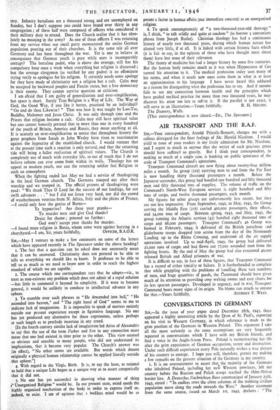AIR TRANSPORT AND THE R.A.F.
Sia,—Your correspondent, Arnold Priestly-Bennett, charges me with a callous disregard for the finer feelings of Mr. Harold Nicolson. I would yield to none of your readers in my lively admiration for Mr. Nicolson, and I regret as much as anyone that the writer of such gracious prose should have suffered so greatly. But I think your correspondent, in making so much of a single case, is banking on public ignorance of the scale of Transport Command's operations.
Transport Command aircraft are now flying about twenty-four million miles a month. Its group (229) carrying men to and from the Far East is now handling thirty thousand passengers a month. Before the Japanese surrender, this group had handled one hundred and fifty thousand men and fifty thousand tons of supplies. The volume of traffic on the Command's North-West European services is eight hundred and fifty tons of cargo, and twelve thousand passengers, each month.
My figures for other groups are unfortunately less recent, but they are not less impressive. From September, 1942, to May, 1945, the Group serving the Middle East (216) carried 400,000 passengers, their effects, and 34,000 tons of cargo. Between spring, 1943, and May, 1945, the group running the Atlantic services (45) handled eight thousand tons of cargo and 68,000 passengers. Transport Command's 46 Group was formed in February, 1944; it delivered all the British parachute cnd gliderborne troops dropped into action from the day of the Normandy Landing up to the Rhine Crossing, and undertook all the air supply operations involved. Up to mid-April, 1945, the group had delivered 21,000 tons of cargo, and had flown out 77,000 wounded men from the fighting fronts. By the end of May the group had also evacuated 40,000 released British and Allied prisoners of war.
It is difficult to say, in face of these figures, that Transport Command has a record of either timidity or failure. It is featherheaded to complain that while grappling with the problems of handling these vast numbers of men, and huge quantities of goods, the Command should have given much of its attention to providing cosy waiting rooms and easy chairs for its less spartan passengers. Developed in urgency, and in war, Transport Command bears many signs of its origin. No blame can attach to anyone






























 Previous page
Previous page